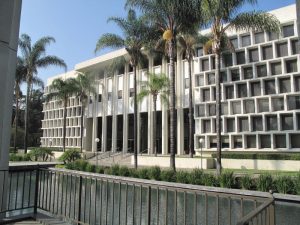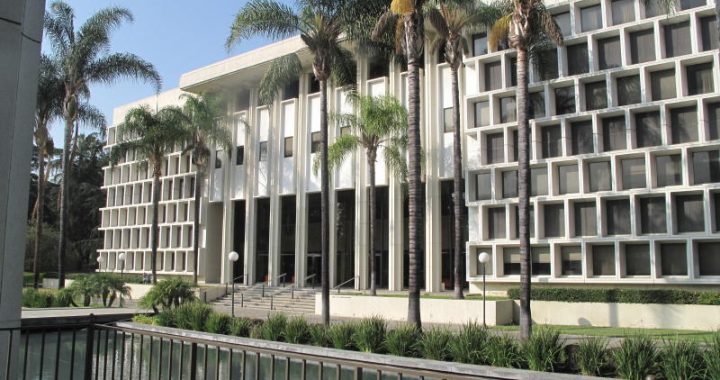The Genesis of the United Church of God
A Personal View from Ground Zero
Chapter 2 Crossing the Rubicon on March 3, 1995
Chapter One concluded with an invitation to delve into an eventful saga, recounting how the United Church of God came into existence. Over the years I have been asked, "What happened?" Here is Chapter Two.

Ambassador College Hall of Administration, my work home from 1990 to 1995.
As the Hall of Administration elevator lifted us to the fourth floor, I was filled with a cacophony of emotions. The night before, my wife Bev and I had made final edits to possibly the most important letter I had ever written.
Together, we were walking away from decades of service to a church that we loved. We had no plan, no premediated intent, no fallback next step. We simply could not in good faith continue on the path that we were on.
As the elevator rose, I wondered what the Pastor General of the Worldwide Church of God –a man I had supported, worked with, and counted as a close friend – would say when I resigned.
Bev and I were accompanied by Doug Horchak, a long-time minister who had also resigned three days earlier. Doug was the son-in-law of Joseph W. Tkach Sr. Doug would support us as we crossed our personal Rubicon. After today there would be no turning back.
The waiting area of the executive offices was quiet and unoccupied when we arrived, the calm before the storm. From many previous meetings, I knew that the senior Tkach liked to get to the office early.
We walked into his office unannounced. The windows lining the office framed the marble pillars of the Ambassador Auditorium, an expansive view that Mr. Herbert Armstrong had enjoyed in the many years he worked in the same office. I had sat in meetings in this office many, many times with leaders of the church and Ambassador College. Today’s meeting would be quite different.
Mr. Tkach looked up as we entered. Seeing Doug, he sensed this was no ordinary meeting. My heart racing, I told him that we needed to talk.
The three of us sat down in front of his desk, papers, books and mementos piled high. He looked uncomfortably at the three of us.
I stated directly but respectfully, “Mr. Tkach, I am resigning as Assistant Director of Church of Administration. Here are my reasons.”
I handed over the first of two letters. Putting on his trademark half-high reading glasses, he began to read silently.
Without preamble, the letter began simply:
“Dear Mr. Tkach,
"This is the most difficult letter I have ever had to write. After serving in the employed ministry of Jesus Christ for almost 26 years I am forced to resign my position in Church Administration due to issues of personal faith and conviction.”
I, together with my wife Bev, felt “forced” because for years I witnessed and lived through the dramatic dismantling of a Church that I loved and dedicated my life to. This effort, now shamelessly overturning cherished beliefs and doctrines, ran totally counter to my commitment as a minister. Two decades earlier I had committed and accepted the responsibility to nurture, care for, and protect those people who had turned their lives to God.
The letter continued, as Mr. Tkach read silently:
“At issue are the doctrinal changes involving the new teaching on the subject of the covenants, Sabbath and Holy Days. While I have always believed that we cannot earn salvation, that salvation is by grace through Jesus Christ only, and that we are ministers of the New Covenant, I do not believe that the Sabbath and Holy Days are mere shadows whose purpose for Christians ended at the death of Christ. I believe that the Sabbath is holy, and that the annual Holy Days have the divine purpose of revealing to Christians the wonderful plan of salvation for mankind.”
After Mr. Armstrong’s death, the Worldwide Church of God enjoyed a burst of growth and influence. Monthly baptisms numbered in the hundreds. Annual donations topped a quarter of a billion dollars (nearly half a billion in 2023 dollars). The television media budget alone came in over $25 million, reaching the No. 1 spot in religious programming (as measured by Nielsen). Millions of publications, including multiple language issues of The Plain Truth magazine, were mailed every month.
We seemed to be on a winning streak, with God blessing our efforts.
Then a contrary spirit moved into the midst of senior leadership. Unchecked, but with broad powers, a small group masterminded a massive shift of doctrinal change for the entire Church. This was not done with broad approval or a meeting of minds. Nor were changes merely small refinement, improvements or updates.
These changes ripped apart and mercilessly tore at the very foundations of our biblical understanding. There was no review process or discussion or “come let us reason together” approach. Longtime beliefs were quickly replaced it with new theology and philosophy. Swept out was our understanding of the Nature of God, the coming Kingdom of God and our days of worship for starters. This was an invasion, a revolution. It was a war on a community of people who were taught to be compliant, submissive, humble. These traits were now exploited.
Not uttering a word, Mr. Tkach continued reading my letter:
“I cannot preach this new teaching in good faith. And as you yourself commented recently, in quoting from Romans 14: whatsoever is not of faith is sin.
“As Assistant Director of Church Administration, I have also come to a point where I can no longer support or have a part in the treatment that long-time loyal ministers have received. To date, several ministers who could not, in good conscience, preach this new material are being treated without the respect and dignity that I feel they deserve--often resulting in their termination from employ by the church after 20 or 30 years.”
Tragically, these enforced changes led to an identity crisis among faithful believers who trusted in their leaders who were there to protect, guide, instruct and encourage. Now, people were reaching and scrambling for safety as they sensed the church turning on them. This was unsettling at the least and frightening at most.
Those like me who had studied and proven their theological footing over decades now had to fight to keep it. Little did these revolutionaries realize the power of conviction and commitment.
Many of us lost the spiritual home where we felt protected, educated and nourished. The Church was our community, but now we became displaced amidst confusion, damaged lives, separated families and destroyed relationships.
Reading toward the end of the first letter, the WCG Pastor General read:
“Mr. Tkach, it is with great sorrow and regret that I take this step, but my personal faith and conscience before God requires it of me. I will continue to pray for the healing of this terrible breach in God's Church--and for you personally.”
Those of us who believed and were convicted of by what we were taught by our Church for decades were now thrust out by that very Church! The year 1995 was an extremely difficult year as our minds and emotions were stretched to their limits of endurance. We reeled in disbelief of “how can this be?” Our hope was that God would deliver us and provide a new home. We did not know how or when it would come to be.
As Mr. Tkach finished the first letter, I waited for his comments. I had thought of the many reactions he might have. But the one he made was not the one I would have expected.
As he put down the first letter, he seemed to be oblivious to all the turmoil in the Church over the past few months, a time of disorder with outrage and resignations. He then sighed and said, “Vic, you do this after all we have done for you?”
Even in the tenseness of the moment, I thought that this was a strange and irrelevant thing to say as I am bringing forward the hottest issues in the Church at that very moment. Even today, as I write this, I am struck at the foreignness of the moment.
The story continues, with the reading of the second letter and the unannounced appearance and reaction of Joe Jr., Mr. Tkach’s son and then the Director of Church Administration (and my direct report).
I will continue this experience in Chapter three, but I would like to leave this chapter with this thought:
Jesus Christ set a high bar for dealing with difficult people and events. He prayed in the last moments of human life: Father, forgive them for they know not what they do” (Luke 23:34). The actions of leaders leading to our parting in 1995 were often harsh, hurtful and unjust to me personally. Today I have a spirit of forgiveness and hope we can all forgive, while at the same time understanding the consequences of what took place. I hope to lay out and preserve this important story without rancor or animosity.
But I hope we will remember the lessons of this time, especially in always contending for the faith once delivered (Jude 3).
Chapter 1

